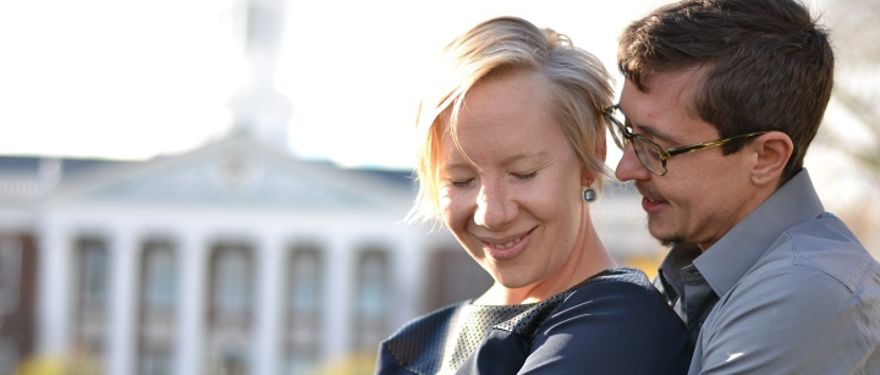I was a month into my first year at HBS, and I was crying in the middle of a case discussion. I didn’t think any of my 90 section mates saw, but as I left class, a man I didn’t know very well walked up to me and said, “I don’t know what happened, but I saw you were upset, and I’m here if you want to talk.”
As part of a suite of cases examining identity in the workplace, we were debating whether a gay man should come out to his coworkers. As the discussion got a little heated, I wanted to raise my hand. I wanted to say that I often wondered if people accept me if they knew hidden parts of my identity.
But I didn’t speak up. To make my point as clearly and as resonantly as I wanted, I would have to explain that I am a cisgender woman in a relationship with a transgender man, and that while I generally prefer men as romantic partners, I am sometimes attracted to women. Because my partner and I look like a heteronormative couple, we don’t usually have to disclose these hidden identities; we can use pronouns consistent with a heterosexual relationship and we don’t have to be concerned about showing affection towards each other in public.
Though we had come out to a few very close friends and family members, we limited disclosing our identities to people who needed to understand that aspect of our story in order for us to form deeper, more open relationships.
Though I was encouraged by the fact that the debate in the classroom during the case discussion was one of acceptance for the LGBT community, I wasn’t sure that everyone in my section felt that way. It felt unsafe to tell 90 people that I had known for less than a month what I had only told a few close friends and family.
A few weeks later, I joined the LGBTSA and learned which of my section mates were also in the club. Gingerly, I approached a few of them and told them about my partner and I. They were supportive, kind, and made special efforts to connect me to others they felt could provide me with resources and perspective.
Shortly after that, another section mate began to organize lunchtime talks where members of our section could sign up for 30-minute slots to tell us about themselves. Bravely, she kicked off the sessions by talking about her own experience with weight loss. Another section mate used the forum to talk about how her father had passed away when she was very young. Their vulnerability in sharing their stories made it easier to have rich, authentic discussions with each of them personally, and within the section classroom more broadly. After discussing it with my partner, I volunteered to give my own talk in late November.
I told a few of my LGBT friends that I would come out to the section during my talk, and they promised that they would be there. Though I was resolved to be very clear and open, I was still afraid, and didn’t sleep much the night before. As I stood in front of the classroom giving my talk, section mates watched me with encouragement and curiosity, not disapproval. When I finished, everyone stood up and clapped, including many additional members of the LGBTSA, who had learned about my talk and had come to support me. I felt utterly surrounded by acceptance.
Over the past two years, I have felt the beautiful echoes of coming out at HBS. A section mate whose religious beliefs made it challenging for them to condone our relationship asked me to coffee so he could more fully consider his stance. Several section mates have asked me how best to structure inclusive questions about gender on market research questionnaires. Many more have approached me to ask more questions, show their support, and have tough, constructive debates about the role of gender in society.
Coming out at HBS isn’t right for everyone, but it was right for me, and I consider it the most transcendent experience of my time at HBS.
Photo credit: Tyler Smith

